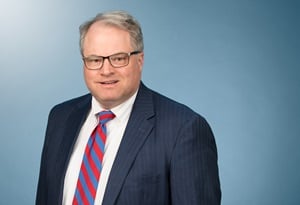Minnesota Legislative Update: Leaders Commit to Bipartisan Objectives
This was an eventful week in Minnesota politics and at the Legislature. On Sunday, at an outdoor rally during a snowstorm on Sunday, U.S. Sen. Amy Klobuchar (D-MN) announced her candidacy for the Democratic presidential nomination. At the state level, Sen. Jason Rarick (R-Pine City) was sworn in on Wednesday afternoon after flipping Senate District 11 red in last week’s special election. This increased the Senate Republican majority to 35-32. Rarick’s victory marks the first time in over 20 years Pine and Carlton counties will not be represented by a senator from the Lourey family. A special election will be held on March 19 to fill the House seat vacated by Rarick’s election.
In an effort to promote a more constructive and open working relationship, Gov. Tim Walz, Majority Leader Paul Gazelka and Speaker Melissa Hortman also announced agreed-upon objectives for the current session. During their press conference, Speaker Hortman compared the typical end of session to a game of high stakes poker, citing the 990-page omnibus budget bill vetoed last minute by former Governor Mark Dayton in 2018 as an example. Governor Walz shared Speaker Hortman’s sentiment, saying the joint deadline agreement will allow Minnesota to take the lead in healing a “fractured political environment” across the country.
In addition to previously announced committee deadlines, the House, Senate and Governor agreed to work to meet the following objectives:
- The House and Senate will pass all major finance bills off their respective floors and leadership will appoint conference committees by May 1.
- The Governor, Senate Majority Leader, and Speaker of the House will provide fiscal targets to the chairs of conference committees on major finance bills by May 6.
- Conference committee chairs shall provide completed conference committee reports to the house of origin by May 13.
Paid Safe and Sick Leave
HF 11, authored by Rep. John Lesch (DFL-St.Paul) was heard in the House Labor Committee on Wednesday. HF 11 mandates the accrual and payment for sick and safe time by all Minnesota employers and is modeled after ordinances recently passed in Minneapolis, St. Paul and Duluth.
As introduced, employees will accrue a minimum of one hour of earned sick and safe time for every 30 hours worked, up to a maximum of 48 hours per year, and any unused portion within a single year will carry over to the next year, not to exceed a maximum of 81 total hours at any one time. The bill would not affect employers with more generous policies already in place. An employee may use the accrued sick and safe time for the employee and/or family members’ health care needs — as well as needs relating to domestic abuse, sexual assault or stalking.
Opponents of HF 11 testified that costs of operating a business in Minnesota are already too high, and the added costs would be the breaking point for many businesses. Furthermore, testifiers representing local businesses argued that their companies already have earned well time, and this bill would interfere with policies currently in place, resulting in less well time overall for their employees. All opposed seemed to share the concern of having a one-size-fits-all mandate.
Proponents of the legislation told committee members the bill would increase health and morale, improving the overall productivity of businesses. Testifiers shared personal stories of being at risk of losing their job due to unforeseen illnesses and expressed support for the bill’s protections against unjust termination.
HF 11 was passed on a party line roll call vote and re-referred to Government Operations Committee. There is currently no Senate companion to the bill.
GOP Budget Priorities
The Senate Republican Caucus held a press conference Wednesday to introduce their budget priorities ahead of Governor Walz’s budget proposal next week. The budget priorities were organized into four areas: caring for people, protecting the taxpayer, controlling spending and holding government accountable, and transparency.
During the press conference, Majority Leader Gazelka said Senate Republicans will avoid tax increases, specifically mentioning the gas tax. He stated he has no intention of tapping into the rainy-day fund, indicating the fund should be reserved for recessions only.
Majority Leader Gazelka also addressed the provider tax which is set to sunset this year, stating he disagreed with Walz’ approach of raising taxes to make up the funding. While the Majority Leader emphasized the importance of working together toward reform, he mentioned tax increases could be one of the “sparring places” between himself and the Governor. Majority Leader Gazelka indicated that there are some issues on which himself and the Governor find common ground; both believe a middle-income tax decrease can be accomplished this session.
Important Dates
- February 19, 2019 – Governor’s Budget Released
- End of February/Early March – February Economic Forecast Released
- March 5, 2019 – Special Election Primary for House District 11B
- March 15, 2019 – First Legislative Committee Deadline
- March 19, 2019 – Special Election for House District 11B
- March 29, 2019 – Second Legislative Committee Deadline
- April 12, 2019 – Third Legislative Committee Deadline
- May 1, 2019 – All Finance Bills Passed Off House/Senate Floor
- May 6, 2019 – Fiscal Targets Given to Finance Bill Conference Committees
- May 13, 2019 – Conference Committee Reports Due to Original Body
- May 21, 2019 – Last Day of the Legislative Session
The material contained in this communication is informational, general in nature and does not constitute legal advice. The material contained in this communication should not be relied upon or used without consulting a lawyer to consider your specific circumstances. This communication was published on the date specified and may not include any changes in the topics, laws, rules or regulations covered. Receipt of this communication does not establish an attorney-client relationship. In some jurisdictions, this communication may be considered attorney advertising.



